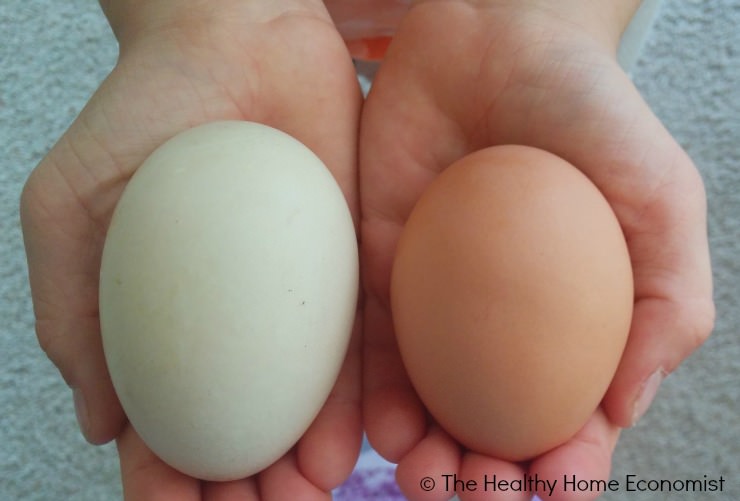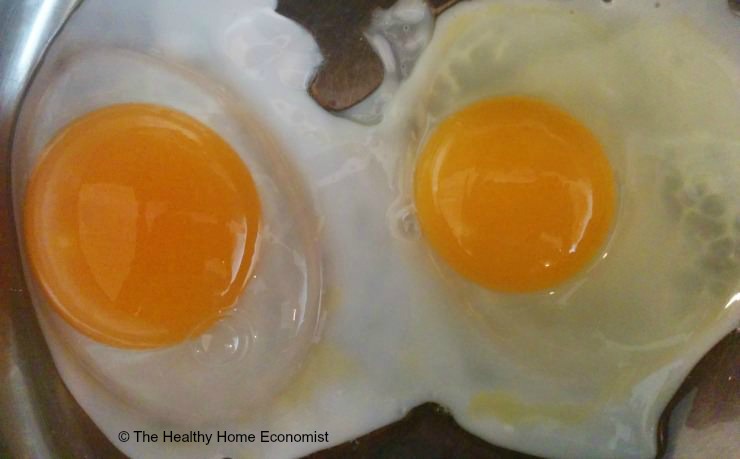 We live on a quiet and peaceful recreational lake that is home to a variety of wildlife including several species of duck.
We live on a quiet and peaceful recreational lake that is home to a variety of wildlife including several species of duck.
While our family adores the incomparable quality of eggs produced by backyard, free-ranging hens, I have always eyed these ducks as a potential source of eggs too.
This especially after visiting Polyface Farm and observing how Joel Salatin (the sustainable, paradigm-busting farmer featured in Michael Pollan’s bestseller The Omnivore’s Dilemma) maintains a flock of ducks for egg laying purposes.
I have occasionally enjoyed duck eggs over the years. Usually, it is a random wild duck egg spied in the yard as a female waddles by, not quite able to make it to her nest before depositing her prize.
Recently, however, one female duck adopted our home and decided that she is one of our chickens.
I’ve tried shooing her away back to her other duck friends many times, but she kept returning to eat the chicken scraps and organic, no soy feed I put out for our layers to supplement their foraging diet. She even goes into the chicken coop while the chickens are out free ranging to sip their water and rest on the straw.
After a while, this duck, who is a muscovy and mallard mix, became so comfortable hanging around our backyard that she decided to give us a real Easter surprise: a down-lined duck nest in our patio bed full of 7 beautiful wild duck eggs!
Duck Eggs Benefits
Duck eggs, especially wild ones, are extremely nutritious and quite a bit different from chicken eggs. Below is an overview of the key variations.
Duck Egg Size
Duck eggs are quite a bit larger than even extra large chicken eggs.
In the picture below, my daughter is holding an extra large chicken egg from one of our backyard hens and a wild duck egg from our new feathered friend.

Duck Egg Nutrition
Due to the larger size, a single duck egg is obviously going to be higher in protein and other nutrients than a corresponding chicken egg. Even after adjusting the nutrients to a per gram level, duck eggs are still the nutritional winner. (1)
Pastry chefs in particular love duck eggs as they are higher in both fat and albumen (egg white). This makes for fluffier, richer baked goods.
A single duck egg compared with a chicken egg contains:
- 6 times the Vitamin D
- 2 times the Vitamin A
- More Vitamin K2 (as MK-4)
- 2 times the beneficial, natural cholesterol
Gram for gram, eggs from ducks are more nutritious than chicken eggs assuming that both are from free-ranging birds that have access to their natural diet. On a macronutrient level, duck eggs have slightly more protein but over 30% more fat – mostly saturated – than chicken eggs.
Mineral content is also higher across the board: calcium, magnesium, phosphorus, potassium, iron, zinc, copper, and selenium.
As might be expected, the higher fat content means a higher proportion of the fat-soluble vitamins, notably A and E which are present in significantly higher amounts per serving.
The water-soluble B vitamins are much higher too. Vitamin B12 is present at 5 times the level in duck eggs as in chicken eggs.
The nutrient that most often scares folks away from duck eggs is cholesterol. Calorie for calorie, duck eggs contain more than twice the natural, beneficial, brain-nourishing cholesterol as chicken eggs. If cholesterol still worries you, know that processed (oxidized) cholesterol in factory foods is the one to avoid. Natural cholesterol as present in ample amounts in duck eggs is a food to be sought out and consumed liberally as practiced by healthy, degenerative disease free ancestral cultures.
Hardness of Duck Egg Shells
Duck eggs, especially wild ones, have incredibly hard shells and deep orange yolks. The yolks are a richer color even than the free-ranging chickens we keep that eat plenty of insects, worms, and grubs.
Duck eggs crack in half perfectly with no splintering and have the look and feel almost like porcelain.
This hard shell means that the eggs are fresh longer.
Duck Egg Color and Yolks
The picture above shows that the color of a duck egg is white. Chicken eggs come in a variety of colors, usually white or brown.
The inside of a duck egg is also different. The picture below is a duck egg and a backyard raised chicken egg cooking side by side in a frying pan.
As you can see, the duck egg has a larger yolk that is slightly richer in color.

Allergic to Chicken Eggs? You May be Able to Eat Duck Eggs
Those who have an allergy to chicken eggs might also suffer cross-reactivity with other types such as goose eggs. Even non-poultry game bird quail eggs may present problems.
However, it is very possible that consumption of alternatives like duck eggs may not produce any symptoms at all.
The only way to know is to try, but do this only under the advice and care of a holistic practitioner. Egg allergies can sometimes trigger anaphylaxis so be very cautious!
Know also that egg allergies potentially can be caused by what the birds are eating, not the eggs themselves. Simply switching to nonGMO, soy and corn free eggs or seeking out eggs from freely foraging birds may solve the problem entirely.
Whatever you try, though, please do not use aquafaba, a dangerous replacement for eggs popularized in some misinformed cooking circles.
Duck Eggs vs Chicken Eggs
Duck eggs aren’t going to replace chicken eggs in popularity anytime soon. If you have the opportunity to enjoy them on occasion, know that they are a delicious and extremely nutritious food to incorporate into your kitchen routine.
Recipes Using Duck Eggs
Looking for recipes using duck eggs? Check out these breakfast egg recipes for a morning boost. Due to their larger size, you will need one less egg for every three chicken eggs called for in the recipe.
And, if you’re like me and enjoy eggs later in the day too, try these egg recipes for lunch and egg recipes for dinnertime.
Sources and More Information
Current Understanding of Egg Allergy
Is Your Egg Allergy a Soy Allergy in Disguise?








I’m not sure the ‘wild’ duck eggs in urban areas would be very good to eat. Our local ducks hang out in apartment ponds which are heavily laden with herbicides and pesticides and they survive on a diet that is at least 50% bread and human trash. I do love duck eggs I just want to know where they come from.
I try to buy duck eggs because they might be raised under different conditions than chickens for those of us who don’t have access to backyard poultry. Do they put ducks in little cages or do ducks need access to a pond where they feed? I ask but have never found out how duck are raised in commercial operations.
I’d also note that if you are Jewish and have to check eggs for blood spots (which would render an egg unKosher), I find that duck eggs don’t seem to have this problem as much as chicken eggs. Sometimes I can go through half a dozen chicken eggs before I find one that is Kosher (no blood spots), but with duck eggs, I haven’t come across a bad one yet hence I prefer to buy duck eggs, better for baking and more nutritious and I don’t feel like I waste my money at the market.
What a neat present! Slightly different topic – I’m wondering about keeping eggs on your counter instead of in the fridge and noticed that the eggs in the nest picture look quite dirty, but the one in your daughter’s hand is just as clean as the chicken egg. Did you clean the eggs after collecting them? How? I’ve read that you don’t want to remove the bloom on the eggs if you’re going to store them outside of the fridge, but some of the eggs we get from the farmer are very dirty. Is it okay for my farmer to quickly rinse them with cool water and scrape off the gunk or should I continue to get them dirty and just clean them before I cook them?
I washed the duck egg before taking a picture of it. I did not wash the chicken egg first as our hens lay on straw and the eggs are always clean when I collect them in the laying box. Yes, the duck nest was in the dirt with lots of down, leaves and other debris that the duck had collected while nesting. The dirt easily wiped off though. The ones that I haven’t cooked yet are unwashed in the basket on the counter. I do not refrigerate my eggs. Once you wash them, the protective bloom is gone and you would need to refrigerate. If you just wipe them off with a cloth, though, you can still keep them on the counter.
Interesting that they are considered less allergenic. The first time I ate a duck egg, which was delicious, I reacted. It felt like I had a stone in my stomach and couldn’t sleep a wink that night. The next time it was one duck egg in a very large amount of goose eggs, which I have no trouble with. Same reaction. Never have a problem with other eggs.
Less allergenic for most people. Many who cannot eat chicken eggs can eat duck eggs without reaction.
Do you have a picture of the duck? Those look like regular Muscovy eggs. A Muscovy crossed with a Mallard-based duck makes a Moulard, which is like a mule, so sterile. If they do lay eggs, they are really small, like a small chicken egg. We have several Muscovy hens, but only Pekin drakes, and the ducklings the hens hatch out are moulards, so we try to harvest them all for meat. If the duck has the red bumpy stuff around the eyes, it’s a full muscovy.
Very interesting! I did not know this about the mallard/muscovy cross. She must be full muscovy then. She looks more muscovy than mallard. I had assumed she had some mallard in her as the other female duck she hangs out with is mostly mallard and she is quite petite also like a mallard compared with a muscovy female.
Are Muscovy ducks ‘edible’? I had the idea that they are not. They run wild all over Miami.
The ducks aren’t so much but the eggs definitely are delish!
Muscovy ducks are considered meat type breed and their meat is leaner compared to other meat breed. Their taste is being compared to beef than birds.
Very interesting! What is it about duck eggs (other than being wild & soy, etc. free) that makes them less allergenic? What about goose eggs?
Good question. Not sure there is a good answer for this yet. Probably the fact that most people haven’t been overexposed to them like with chicken eggs and the processed/GMO feed they get.
Duck eggs are also not used to make vaccines, as chicken eggs are. We are planning to start a flock of ducks soon, as they seem to handle our cool mountain climate better than chickens.
Excellent point Heather!
I have always put a raw chicken egg in my smoothie and it’s been great. When I heard about duck eggs, I switched. Our ducks have pasture, grain, and non GMO layer pellets. But when I put a duck egg in my smoothie I get very sick. within half an hour I an queezy and usually vomiting soon after. I feel completely drained and lethargic. Why is is that something that is ‘better’ for me make me so sick??!! It’s really frustrating because the TASTE SO GOOD!!!!
We had a a duck lay eggs in our flower bed last year. It never occurred to me that I could cook the eggs. However, we just left the duck alone to come and go as she pleased and several weeks or days later themeggs hatched into ducklings. So if I would have cracks themeggs before the incubation period, they would have not turned into ducklings?
Yes, you would have to get them out of the nest pretty quickly as they would most likely be fertilized. However, it’s no different than dealing with fertilized chicken eggs if you have backyard hens and a rooster.